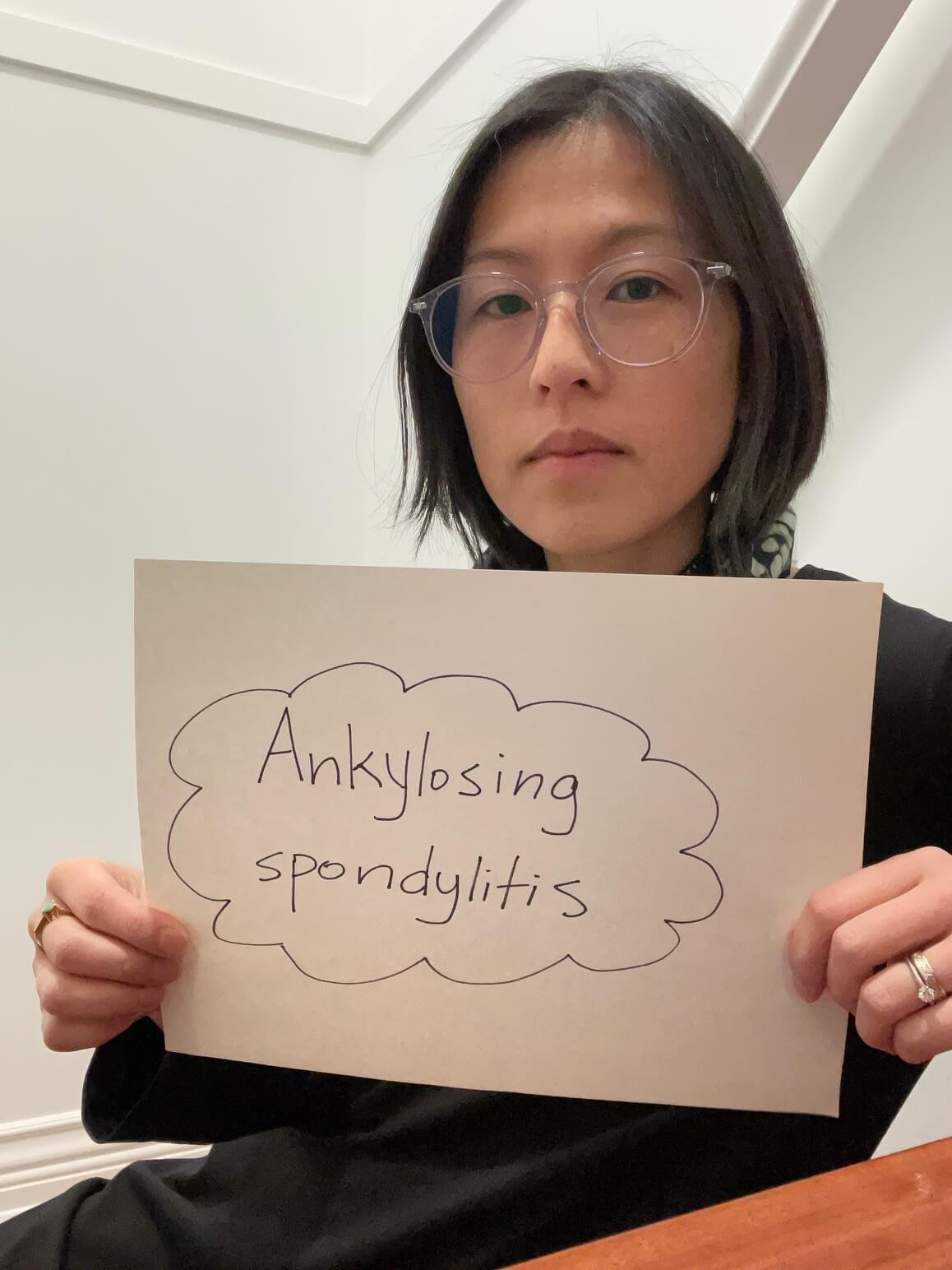Self-Advocacy Q&A with Tania Reitsma
Tania Reitsma
Sharing My journey with Ankylosing Spondylitis, balancing motherhood and advocacy. Insights on managing an invisible condition, emphasizing community and self-care.
“The worst experience in my youth was when an English teacher with ZERO medical training questioned whether my pain was “all in my head”. Though I’ve forgiven her for her ignorance and lack of compassion and curiosity, I certainly haven’t forgotten—That’s why I’m so passionate about spreading personal stories and raising awareness. ”
Tell us a bit about yourself, your diagnosis journey and the invisible condition/s you are living with.
Hi, I’m Tania Reitsma. I live with Ankylosing Spondylitis (AS), a type of autoimmune arthritis that currently has no cure. I was diagnosed at the age of 18 and have been going through its ups and downs for about 25 years and counting.
Navigating life with AS is a huge part of my life requiring much time, self-advocacy, patience and perseverance, but it doesn’t define me. I’m a mother of two compassionate kids ages seven and ten, and I’m one of the board members of Invisible Condition founded by my husband Tim.
What else keeps me busy? A few other jobs include freelance copywriting and search engine optimization for small businesses. In my spare time (yes—I actually have spare time), I volunteer to help newcomers with English conversation, and I run a local blog and podcast called Steveston People that showcases the amazing local businesses, artists and neighbours in our community of Steveston in Richmond, BC Canada.
How would your friends describe you and your personality?
I’m an introvert and get anxious in new social situations—dinner parties with strangers scare me! But once you get to know me you’ll realize how silly I am. When I’m with people one on one, I can usually get a chuckle out of them. And people usually feel comfortable with me when I engage them in deep conversations—which helps to get all the juicy details for my Steveston People blog and podcast!
How has the invisible condition impacted your life?
Living with AS has influenced all areas of my life.
In these recent years, I’ve chosen a career and work arrangement that works around my disability. Although being a contractor isn’t currently making me rich, nor does it include some of the benefits I once enjoyed in my previous employment, I have the freedom to focus on my health condition that can be unpredictable at times. I can also take breaks when I need them and catch up on work when I’m feeling better. Stress is a huge trigger for my AS, so having more flexibility and autonomy (not feeling guilty about asking for time off) makes life less stressful.
I have learned to stop comparing myself to others, which is very freeing. When I was a new mother, I used to feel guilty about not always having the strength or energy to take the kids to the playground when they were little. So I had to challenge myself and shift my perception of what it means to be a “good mom”.
In parenting, I am trying more to emphasize character over achievement. For example, if they experience health problems, they might not be the star athlete or top student anymore, but they can always be kind, helpful and understanding. I’m also teaching my kids to be considerate. For example, “Walk instead of run in the grocery store because you might injure someone who has bad balance or arthritis like me.” “Other people might have sensitivities to loud noises, so let’s use our indoor voices at the mall.”
Looking back in time before getting my diagnosis—in the first few years of its onset during high school, I was in so much pain and stiffness all over my body. It got so bad that I had to quit sports teams, bow out of social activities, and take naps everyday just to deal with the fatigue. I had a supportive group of friends, but some kids teased me because I would hobble down the hallways in school.
The upside of being in my forties now is that most of my friends don’t want to stay out late and party. But when I was younger, it was hard to keep up socially. I always felt like the party pooper who had to go home by 9pm because my body was beat! When I was in university, I really wanted to study abroad, but being away from my trusted healthcare team was too much of a risk. You see (pun intended), AS can affect the eyes causing iritis. When that happens, I need quick access to my ophthalmologist so I don’t end up blind! In university, hearing of the adventures of my peers who studied abroad, backpacking in foreign countries (while I could barely handle carrying my school bag)—it made me feel depressed for sure!
Please share any experiences of stigma or discrimination that you have experienced due to your condition.
A lot of people still don’t realize that not all disabilities are visible. A few years ago, while sitting on public transit, a woman asked me to get up because those seats were reserved for people with disabilities and seniors. Although I felt angry, I kept my composure while explaining that I do live with a disability and that I needed a seat because of my pain and fatigue.
Some people have it in their minds that arthritis is an old person’s disease and that there’s only a couple types of arthritis (when in reality there are more than 100 forms of arthritis and related diseases). In my late teens and twenties, people would often say to me, “But you’re too young to have arthritis.”
Some people who don’t understand what causes my immune system to flare would make remarks about me not eating the right food, or not exercising enough. I am not lazy, and my flare-ups are not by choice.
The worst experience in my youth was when an English teacher with ZERO medical training questioned whether my pain was “all in my head”. Though I’ve forgiven her for her ignorance and lack of compassion and curiosity, I certainly haven’t forgotten—That’s why I’m so passionate about spreading personal stories and raising awareness.
What does self-advocacy mean and how have you managed to advocate for yourself? Any advice to share?
Having experienced grief and loss of identity, I realized that I have a lot of life ahead of me. In order for me to live my best life, be able to care for my kids, have a career and contribute to my community—I have to ask for help when I need it and seek answers to make the best decisions for myself.
My top 2 pieces of advice around self-advocacy are:
If you’re not satisfied with the answer and level of care you are receiving from your healthcare professional, request a referral to a different provider. Ask your network about good doctors that they would recommend.
For example, I found my Rheumatologist through asking someone I knew at the Arthritis Society. I asked my family doctor to refer me to her because I was not satisfied with the Rheumatologist that I had and needed a change.
Ask for help. Oftentimes, your friends and family members want to help you, but don’t know how. So if they ask, “How can I help?” be specific.
For me, sometimes my answer is, “Thanks, can you babysit the kids on Friday, from 3-6pm while I go to my appointment?” or “Thanks, would you be able to prepare some easy meals that I can keep handy in the freezer?” or “Thanks, I just need to hang out with someone, can we meet for coffee and a gentle walk?” When I was struggling through flare-ups while caring for a newborn, one of my go-to answers was “Thanks, can you help me with laundry?”
What motivates you to disclose your disability despite the courage it requires?
My hope is that the more people hear about and understand AS, there will be more compassion and less discrimination against people in the same situation. As a writer, I feel I have a responsibility to use my “gifts” in communication in order to help people who lack the confidence or words to spread awareness.
What encouragement would you offer to someone living with an invisible condition who is considering whether to openly share their journey and experiences?
Sharing about your invisible condition is entirely your choice. You should never feel pressured to share your story if you don’t feel safe, because sadly, there are trolls out there who don’t want to hear and only want to judge. There’s also a lot of people trying to sell you miracle diets and exercise plans. So trust your instincts.
But there’s ALWAYS someone around who is willing to listen, who will ask you to tell them more, and respond with compassion. Make friends with those people!




